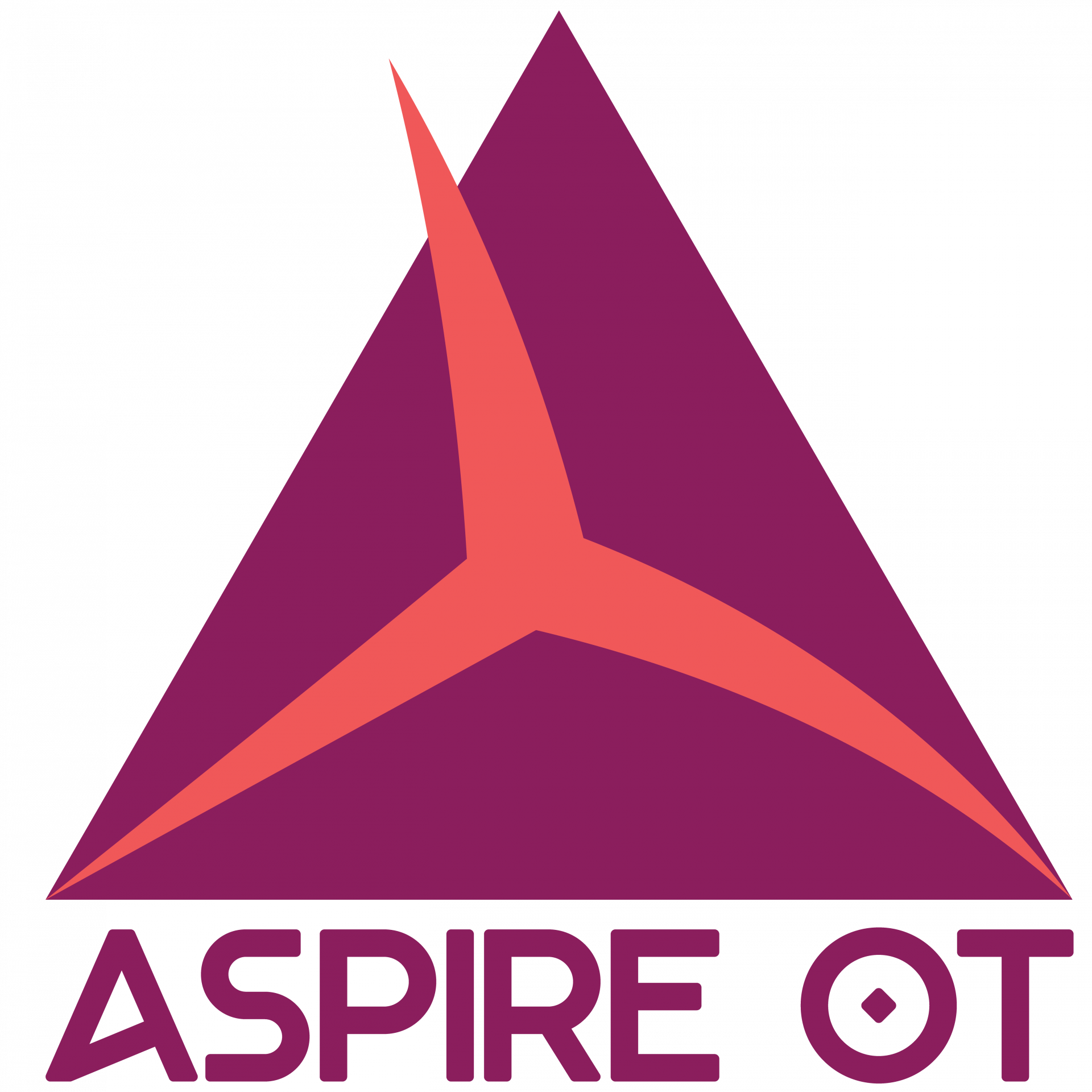
Welcome to guest blogger and Aspire OT instructor!
Abby Waters, COTA/L, LPN, CPEQ, CPD, CDF
Emotional intelligence skills are not only valuable for the occupational therapy practitioner; they are absolutely necessary for working and living successfully. Emotional intelligence skills help us regulate our emotions and allow us to adapt while understanding the emotions of others. Being “in tune” with our emotional intelligence skills allows us greater capacity to balance our response to stress, tolerate different viewpoints from clients and co-workers, and help us to regulate our emotions in the workplace.
In this blog article, we will discuss self-awareness and self-regulation skills; two foundational areas of emotional intelligence that impact professional behavior for occupational therapy practitioners.
Self-awareness is the ability to be aware of who you are instead of simply reacting to what is going on around you. You can evaluate your self-awareness skills by taking an emotional intelligence assessment, reading leadership development books, asking for feedback from a mentor or trusted co-worker, daily journaling, and reflecting on what goes right or wrong in your practice as an OT practitioner.
While it’s easy to judge ourselves, it’s important to assume a posture of curiosity and avoid black and white thinking when you are evaluating personal self-awareness and leadership skills. Ask yourself questions about how you feel when you are working with a client or a co-worker who might trigger or upset you. You can evaluate if your body language and facial expressions align often with your true feelings at the moment.
Have you ever asked someone out of concern how they were doing? They may have answered back that everything was fine, but their facial expressions, tone of voice, or body language, could have indicated otherwise. Oftentimes we walk around in a state of disconnect from our feelings without knowing how we might be projecting our moods or feelings onto our clients or co-workers throughout our workday. Just like using a regular thermometer to check your internal body temperature, you can take your emotional temperature throughout the day as a way to check in with self-awareness.
Another domain of emotional intelligence that flows directly from self-awareness is self-regulation. Self-regulation is the ability to regulate your emotions, control your body language, and act with logic instead of acting on emotion or responding impulsively.
As occupational therapy practitioners, it’s necessary to pause and observe the emotions and behaviors of our clients. It helps us gather the necessary information as we ask questions about where we want to go with treatment planning and managing client-centered outcomes. It requires a great deal of self-regulation to compose yourself when working with a difficult client or working under a supervisor who might have unrealistic expectations or a different personality style.
When you consider the challenge of remaining in a balanced state to regulate yourself, remember that strong emotions arise when we are triggered or when we were hoping for a different outcome. Self-regulation or lack thereof can become out of balance when we over predict, under plan for time and resources, or when we find ourselves frustrated. Next time you find your stress levels rising, remember to pause for reflection, practice deep breathing, and lead with empathy first before jumping to a conclusion that is activated by your ego that is on high alert.
When we take time to pause and reflect on why emotional intelligence matters for the occupational therapy practitioner, we discover that we are open to evolving as leaders, working in greater harmony with others, and celebrating a way forward for continued personal and professional growth for the good of ourselves and excellent client-centered care.
In this blog article, we will discuss self-awareness and self-regulation skills; two foundational areas of emotional intelligence that impact professional behavior for occupational therapy practitioners.
Self-awareness is the ability to be aware of who you are instead of simply reacting to what is going on around you. You can evaluate your self-awareness skills by taking an emotional intelligence assessment, reading leadership development books, asking for feedback from a mentor or trusted co-worker, daily journaling, and reflecting on what goes right or wrong in your practice as an OT practitioner.
While it’s easy to judge ourselves, it’s important to assume a posture of curiosity and avoid black and white thinking when you are evaluating personal self-awareness and leadership skills. Ask yourself questions about how you feel when you are working with a client or a co-worker who might trigger or upset you. You can evaluate if your body language and facial expressions align often with your true feelings at the moment.
Have you ever asked someone out of concern how they were doing? They may have answered back that everything was fine, but their facial expressions, tone of voice, or body language, could have indicated otherwise. Oftentimes we walk around in a state of disconnect from our feelings without knowing how we might be projecting our moods or feelings onto our clients or co-workers throughout our workday. Just like using a regular thermometer to check your internal body temperature, you can take your emotional temperature throughout the day as a way to check in with self-awareness.
Another domain of emotional intelligence that flows directly from self-awareness is self-regulation. Self-regulation is the ability to regulate your emotions, control your body language, and act with logic instead of acting on emotion or responding impulsively.
As occupational therapy practitioners, it’s necessary to pause and observe the emotions and behaviors of our clients. It helps us gather the necessary information as we ask questions about where we want to go with treatment planning and managing client-centered outcomes. It requires a great deal of self-regulation to compose yourself when working with a difficult client or working under a supervisor who might have unrealistic expectations or a different personality style.
When you consider the challenge of remaining in a balanced state to regulate yourself, remember that strong emotions arise when we are triggered or when we were hoping for a different outcome. Self-regulation or lack thereof can become out of balance when we over predict, under plan for time and resources, or when we find ourselves frustrated. Next time you find your stress levels rising, remember to pause for reflection, practice deep breathing, and lead with empathy first before jumping to a conclusion that is activated by your ego that is on high alert.
When we take time to pause and reflect on why emotional intelligence matters for the occupational therapy practitioner, we discover that we are open to evolving as leaders, working in greater harmony with others, and celebrating a way forward for continued personal and professional growth for the good of ourselves and excellent client-centered care.
Aspire OT has a variety of mental health focused courses.
We are better together!
Don't Miss A Thing!
Follow us on social media to stay up to date on all of our latest postings.
Join our newsletter
Get weekly updates on new blog posts, webinars, on-demand courses and more right in your mailbox.
Thank you!
Write your awesome label here.
Coaching, JUST for OT Practitioners!
Are you having difficulty explaining what OT is to your clients and colleagues?
Do you feel like you need more mentorship and feedback in your clinical practice?
Do you feel like you need more mentorship and feedback in your clinical practice?
Just for OT Coaching is here to help you! Let Kim and Niccole share their experiences in implementing psychosocial assessment and treatment into non-mental health settings to help you be successful!


